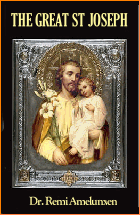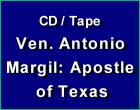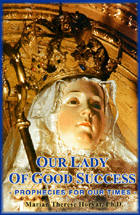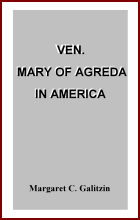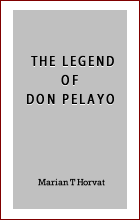American History
 |
 |
 |
 |
 |
 |
 |
Fundamental Errors of the Founding Fathers - 1
Thomas Jefferson: Rationalist & Epicurean
Americans generally look up to Thomas Jefferson as an idol. His picture is featured on the $2 bill, and a monument honoring him – one that strangely resembles the temples of the Greek gods – stands in our country’s capitol. As a Founding Father of our country and the writer of the Declaration of Independence,
the real Jefferson deserves to be known. What were his beliefs and what was his aim in helping to found America?
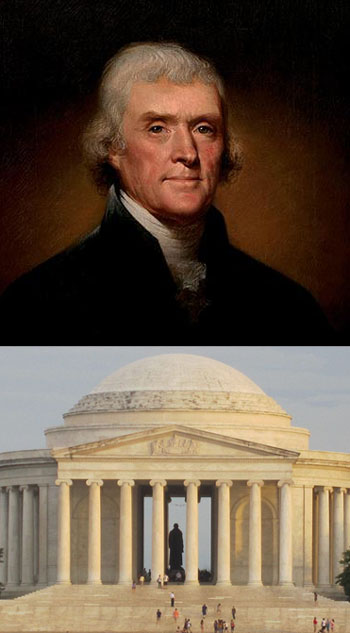 The reality is often overlooked by many American Catholics, who, putting their place as American above that of being Catholic, like to claim that our Founding Fathers were all "good Christians" who based our government on Christian principles. As will be demonstrated in this series of articles, this supposition is far from the truth.
The reality is often overlooked by many American Catholics, who, putting their place as American above that of being Catholic, like to claim that our Founding Fathers were all "good Christians" who based our government on Christian principles. As will be demonstrated in this series of articles, this supposition is far from the truth.
Thomas Jefferson grew up in the aristocratic circles of the American Colony of Virginia. He attended William and Mary College where he met Dr. William Small, a man who would have a great influence on the young revolutionary.
Jefferson writes in his autobiography: “It was my great good fortune, and what probably fixed the destinies of my life that Dr. Wm. Small of Scotland was then professor of Mathematics, a man profound in most of the useful branches of science, with a happy talent of communication, correct and gentlemanly manners & an enlarged & liberal mind.
“He, most happily for me, became soon attached to me & made me his daily companion when not engaged in the school; and from his conversation I got my first views of the expansion of science & of the system of things in which we are placed.” (1)
Dr. William Small was a member of the Lunar Society, a membership attained through the recommendation of Benjamin Franklin. (2) This Society consisted of men devoted to the Enlightenment and the study of natural philosophy. Though not officially Freemasonic, many of its members had Masonic ties, e.g. Erasmus Darwin and James Watt, (3) both noteworthy for their contributions to modern society.
Erasmus Darwin developed his own theories of evolution before his grandson, Charles Darwin, popularized the theory with his infamous work. James Watt drastically changed the world by inventing the steam engine. From just these two examples, it is easy to see that the members of the Lunar Society were aficionados of modern science who paved the way to the Industrial Revolution. (4)
It was this school of thought, built on Enlightenment principles and evolutionary theories, that contributed to Jefferson’s formation. As a consequence, he was a devotee of modern science, which banished God to the outskirts of His creation, and of modern philosophy, which denied man's ability to attain knowledge of the truth.
Jefferson's models
In one of Jefferson’s letters he mentions his “room being hung around with a collection of the portraits of remarkable men; among them were those of Bacon, Newton & Locke... They were my trinity of the three greatest men the world had ever produced.” (5) It seems that Jefferson, who rejected the Holy Trinity, found another “trinity” to worship – three men who helped to destroy Christendom and replace it with the modern world.
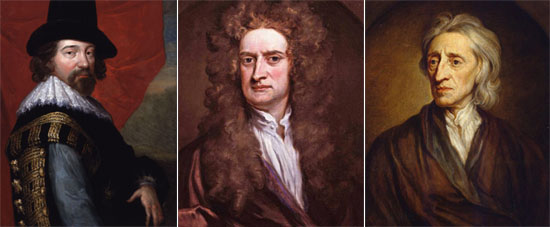 None of Jefferson’s “trinity” were Catholic, either in thought or deed. In fact, they all despised the Catholic Church and the civilization she built: Francis Bacon, who became Lord Chancellor of England and Viscount of Alban in the time of James VI of Scotland, favored Puritanism and adamantly advocated for the execution of the very Catholic Mary Queen of Scots. (6)
None of Jefferson’s “trinity” were Catholic, either in thought or deed. In fact, they all despised the Catholic Church and the civilization she built: Francis Bacon, who became Lord Chancellor of England and Viscount of Alban in the time of James VI of Scotland, favored Puritanism and adamantly advocated for the execution of the very Catholic Mary Queen of Scots. (6)
Sir Isaac Newton rejected the Catholic Church, denying the divinity of Christ and the doctrine of the Holy Trinity along with many other truths of the Faith. In his copious theological research, he reinterpreted Holy Scripture and studied the supposed evolution of Christianity from shortly after Christ’s death to modern times.
He considered himself to be one of the few pure Christians in the world and awaited the day when the Church of England would, following his example, become “enlightened.” In his Memoirs of Newton, John Conduitt names Newton “a Savior to mankind ... who was to introduce a freedom of thinking & to teach men not to give up their reason to any System howsoever dignified or established.” (7)
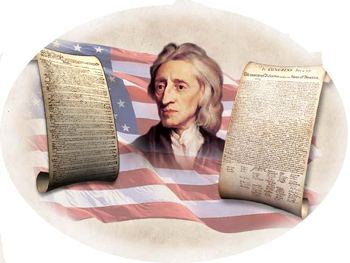 John Locke, a close friend of Newton, shared many of his religious beliefs. The two friends were particularly insistent upon religious tolerance and freedom of religion, claiming that a truly Christian nation would have no form of prejudice or persecution against differences of opinion concerning religion. Additionally, Locke developed the theory of Empiricism, in which every man could judge for himself what is morality and truth. He went so far as to say that we must judge the actions of Jesus Christ in relation to our own self-examination.
John Locke, a close friend of Newton, shared many of his religious beliefs. The two friends were particularly insistent upon religious tolerance and freedom of religion, claiming that a truly Christian nation would have no form of prejudice or persecution against differences of opinion concerning religion. Additionally, Locke developed the theory of Empiricism, in which every man could judge for himself what is morality and truth. He went so far as to say that we must judge the actions of Jesus Christ in relation to our own self-examination.
Jefferson adopted Locke's ideas as if they were his own, an attitude evident in his letters and writings. In a 1787 letter to his nephew and ward, Peter Carr, Jefferson offered the following advice: "Fix Reason firmly in her seat, and call to her tribunal every fact, every opinion. Question with boldness even the existence of a God; because, if there be one, he must more approve the homage of reason than of blindfolded fear. ...
"Do not be frightened from this inquiry by any fear of its consequences. If it end in a belief that there is no God, you will find incitements to virtue in the comfort and pleasantness you feel in its exercise and in the love of others which it will procure for you... Your own reason is the only oracle given you by heaven, and you are answerable not for the rightness but uprightness of the decision." (8)
It is apparent that the only god Jefferson worshiped was the god of reason, the logical consequence of following Locke’s principles. Further, in a letter to Francis Hopkinson, Jefferson states: "I never submitted the whole system of my opinions to the creed of any party of men whatever in religion, in philosophy, in politics or in anything else where I was capable of thinking for myself. Such an addiction is the last degradation of a free and moral agent." (9)
Thus he religiously followed his own limited reason, deeming himself above Divine Revelation and more capable of discovering the meaning of life than any other man. It is the pride of an "enlightened man," who foolishly thinks that he does not need God. Ironically, Jefferson, who pretended not to have submitted his opinions to any man, clearly looked to Locke as a mentor and adopted his language and thinking.
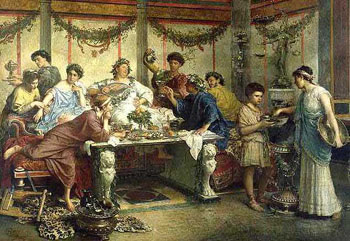
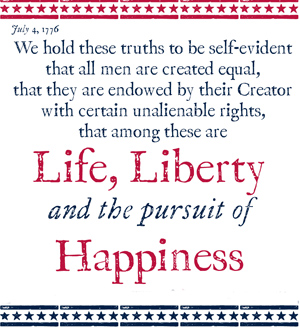 In fact, the Declaration of Independence is very similar to Locke's Second Treatise of Government, so closely did Jefferson follow the teachings of one member of his models. The same founding document also contains a peculiar phrase that betrays Jefferson’s own philosophy of life: Replacing Locke’s right to property as an inherent right of man, he inserted “the pursuit of happiness.” This is the philosophy of an Epicurean.
In fact, the Declaration of Independence is very similar to Locke's Second Treatise of Government, so closely did Jefferson follow the teachings of one member of his models. The same founding document also contains a peculiar phrase that betrays Jefferson’s own philosophy of life: Replacing Locke’s right to property as an inherent right of man, he inserted “the pursuit of happiness.” This is the philosophy of an Epicurean.
Jefferson admited his adherence to this philosophy in a letter to William Short: “As you say of yourself, I too am an Epicurean. I consider the genuine (not the imputed) doctrines of Epicurus as containing everything rational in moral philosophy which Greece & Rome have left us.” (10)
The same letter includes as a kind of postscript “A Syllabus of the doctrines of Epicurus.” The universe, according to this syllabus, is eternal with interchangeable parts, consisting of “matter and void alone.” “Gods” are superior beings who enjoy happiness in their own sphere and do not meddle with the concerns of Earth.
The goal of life is happiness, which can be obtained through the practice of virtue and pleasure, with the absence of bodily pain to obtain peace of mind. Desire and fear must be avoided because they disturb happiness. Above all, “man is a free agent.”
It is evident that these doctrines are not compatible with the Catholic Faith. Pleasure is not the end of life. On the contrary, Catholics should have a desire to suffer in imitation of Our Lord, that we might follow Him on the royal road of the Cross and merit eternal salvation.
A form of government that has as one of its underlying principles “the pursuit of pleasure” is destined to fail. For, if every man has a right to his own happiness, no one can prevent him from offending God in that pursuit. America was thus destined to end as it is today: with full rights for every man to do as he pleases, whether he wishes to change his gender or abort a child.
As Catholics, we must reject the teachings of Epicurus and Locke, and, for this reason, we should also question Jefferson's principles which denied the divinity of Christ and were against the authority and doctrine of the Catholic Church.
Continued


Jefferson at age 58, and today's Jefferson Monument
Thomas Jefferson grew up in the aristocratic circles of the American Colony of Virginia. He attended William and Mary College where he met Dr. William Small, a man who would have a great influence on the young revolutionary.
Jefferson writes in his autobiography: “It was my great good fortune, and what probably fixed the destinies of my life that Dr. Wm. Small of Scotland was then professor of Mathematics, a man profound in most of the useful branches of science, with a happy talent of communication, correct and gentlemanly manners & an enlarged & liberal mind.
“He, most happily for me, became soon attached to me & made me his daily companion when not engaged in the school; and from his conversation I got my first views of the expansion of science & of the system of things in which we are placed.” (1)
Dr. William Small was a member of the Lunar Society, a membership attained through the recommendation of Benjamin Franklin. (2) This Society consisted of men devoted to the Enlightenment and the study of natural philosophy. Though not officially Freemasonic, many of its members had Masonic ties, e.g. Erasmus Darwin and James Watt, (3) both noteworthy for their contributions to modern society.
Erasmus Darwin developed his own theories of evolution before his grandson, Charles Darwin, popularized the theory with his infamous work. James Watt drastically changed the world by inventing the steam engine. From just these two examples, it is easy to see that the members of the Lunar Society were aficionados of modern science who paved the way to the Industrial Revolution. (4)
It was this school of thought, built on Enlightenment principles and evolutionary theories, that contributed to Jefferson’s formation. As a consequence, he was a devotee of modern science, which banished God to the outskirts of His creation, and of modern philosophy, which denied man's ability to attain knowledge of the truth.
Jefferson's models
In one of Jefferson’s letters he mentions his “room being hung around with a collection of the portraits of remarkable men; among them were those of Bacon, Newton & Locke... They were my trinity of the three greatest men the world had ever produced.” (5) It seems that Jefferson, who rejected the Holy Trinity, found another “trinity” to worship – three men who helped to destroy Christendom and replace it with the modern world.

Jefferson's models - Francis Bacon, Isaac Newton & John Locke
Sir Isaac Newton rejected the Catholic Church, denying the divinity of Christ and the doctrine of the Holy Trinity along with many other truths of the Faith. In his copious theological research, he reinterpreted Holy Scripture and studied the supposed evolution of Christianity from shortly after Christ’s death to modern times.
He considered himself to be one of the few pure Christians in the world and awaited the day when the Church of England would, following his example, become “enlightened.” In his Memoirs of Newton, John Conduitt names Newton “a Savior to mankind ... who was to introduce a freedom of thinking & to teach men not to give up their reason to any System howsoever dignified or established.” (7)

John Locke's thinking was embedded in the Constitution & Declaration of Independence
Jefferson adopted Locke's ideas as if they were his own, an attitude evident in his letters and writings. In a 1787 letter to his nephew and ward, Peter Carr, Jefferson offered the following advice: "Fix Reason firmly in her seat, and call to her tribunal every fact, every opinion. Question with boldness even the existence of a God; because, if there be one, he must more approve the homage of reason than of blindfolded fear. ...
"Do not be frightened from this inquiry by any fear of its consequences. If it end in a belief that there is no God, you will find incitements to virtue in the comfort and pleasantness you feel in its exercise and in the love of others which it will procure for you... Your own reason is the only oracle given you by heaven, and you are answerable not for the rightness but uprightness of the decision." (8)
It is apparent that the only god Jefferson worshiped was the god of reason, the logical consequence of following Locke’s principles. Further, in a letter to Francis Hopkinson, Jefferson states: "I never submitted the whole system of my opinions to the creed of any party of men whatever in religion, in philosophy, in politics or in anything else where I was capable of thinking for myself. Such an addiction is the last degradation of a free and moral agent." (9)
Thus he religiously followed his own limited reason, deeming himself above Divine Revelation and more capable of discovering the meaning of life than any other man. It is the pride of an "enlightened man," who foolishly thinks that he does not need God. Ironically, Jefferson, who pretended not to have submitted his opinions to any man, clearly looked to Locke as a mentor and adopted his language and thinking.

The Epicureans were concerned with happiness on this earth; the model for Jefferson's pursuit of happiness

Jefferson admited his adherence to this philosophy in a letter to William Short: “As you say of yourself, I too am an Epicurean. I consider the genuine (not the imputed) doctrines of Epicurus as containing everything rational in moral philosophy which Greece & Rome have left us.” (10)
The same letter includes as a kind of postscript “A Syllabus of the doctrines of Epicurus.” The universe, according to this syllabus, is eternal with interchangeable parts, consisting of “matter and void alone.” “Gods” are superior beings who enjoy happiness in their own sphere and do not meddle with the concerns of Earth.
The goal of life is happiness, which can be obtained through the practice of virtue and pleasure, with the absence of bodily pain to obtain peace of mind. Desire and fear must be avoided because they disturb happiness. Above all, “man is a free agent.”
It is evident that these doctrines are not compatible with the Catholic Faith. Pleasure is not the end of life. On the contrary, Catholics should have a desire to suffer in imitation of Our Lord, that we might follow Him on the royal road of the Cross and merit eternal salvation.
A form of government that has as one of its underlying principles “the pursuit of pleasure” is destined to fail. For, if every man has a right to his own happiness, no one can prevent him from offending God in that pursuit. America was thus destined to end as it is today: with full rights for every man to do as he pleases, whether he wishes to change his gender or abort a child.
As Catholics, we must reject the teachings of Epicurus and Locke, and, for this reason, we should also question Jefferson's principles which denied the divinity of Christ and were against the authority and doctrine of the Catholic Church.
Continued
- Thomas Jefferson, The Works of Thomas Jefferson, vol. 1 (Autobiography, Anas, 1760-1770), see here
- See here
- See here
- See here
- "Thomas Jefferson to Benjamin Rush, 16 January 1811,” Founders Online, National Archives, accessed March 5, 2020, see here
- “Parliamentarian.” Francis Bacon. Wikipedia.
- Robert Iliffe, Newton’s Religious Life and Works.
- “From Thomas Jefferson to Peter Carr, with Enclosure, 10 August 1787,” Founders Online, National Archives, accessed March 3, 2020
- “From Thomas Jefferson to Francis Hopkinson, 13 March 1789,” Founders Online, National Archives, accessed March 3, 2020
- “From Thomas Jefferson to William Short, 31 October 1819,” Founders Online, National Archives, accessed March 3, 2020

Posted April 1, 2020
______________________
______________________



